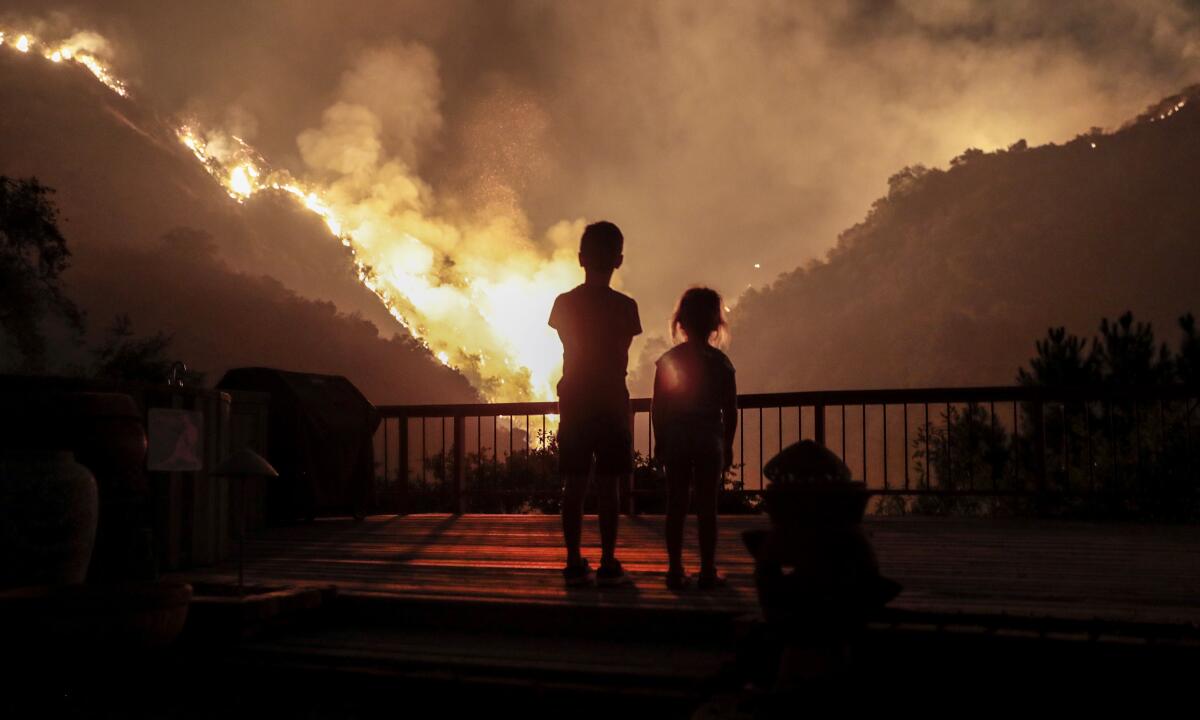Opinion: The climate future is bleak. How scientists give their children hope without lying

- Share via
Having a child is the most emphatic statement of hope a person can make. I have three young kids, and yet I have trouble remaining optimistic about the world they and their children will inhabit in 2100 and beyond.
The world 77 years from now is likely to be far hotter and more unstable, warmed in a way that depopulates entire metropolises and renders farmland nonarable. It’s a world the latest report from the United Nations Intergovernmental Panel on Climate Change warns will become reality unless we make dramatic, immediate reductions in our fossil fuel use.
We’re not on track to make those changes in time to prevent a world in which animal and plant species will die off at an alarming rate. And yet, kids deserve to have hope.
But not false hope. That was emphasized to me by Peter Kalmus, one of the climate scientists I called a few months ago to discuss the dissonance of raising children in a world we know to be headed for breakdown. In fact, “Earth breakdown” was the term he used to describe the ecological collapses and natural disasters that would be brought about by the global warming we face.
Kalmus told me his children, both of whom are teenagers, don’t talk to him much about climate change. “I think false hope is a dangerous thing in general because it contributes to a lack of urgency, when we should all be feeling extreme urgency instead,” Kalmus told me. He said he doesn’t try to fill his children with pessimism, but “what I emphatically would not do is lie to my kids in any way.”
So he gives his children hope by actually trying to prevent Earth breakdown. And Kalmus is trying, arguably as hard as anyone.
He and three scientists were arrested last year for chaining themselves to a Chase Bank in downtown Los Angeles to protest JPMorgan Chase & Co.’s industry-leading fossil fuel investments. More recently, he chained himself to the door of a private-jet terminal in Charlotte, N.C., saying the climate emergency requires ramping down aviation.
His civil disobedience is getting the attention of young people. He is the only climate scientist whom any of my children have mentioned to me by name.
Kalmus’ “be the change” ethos dovetails somewhat with what Melissa Burt told me. She’s an atmospheric science professor at Colorado State University who also helped found Science Moms, a climate advocacy campaign aimed at parents.
“Climate change literally affects everything, and that’s why people need to know,” Burt said. “What is one thing you love to do? Well, we can have a conversation about how that will be different.”
Parents taking concrete action can indicate to their children that they actually care about the problem, she said.
On that front, we’ve made progress in our home. For much of my life I’ve been an enthusiastic cyclist and transit commuter, so my children have grown up using sustainable transportation. We’ve also had an electric car since 2018, and early in the pandemic we stopped eating meat (animal agriculture is the second-biggest human-caused source of greenhouse gas emissions).
That last change was the easiest to make, as our kids never could morally square the idea that animals needed to die so they could eat. Plus, cutting out meat right before inflation spiked was good timing.
Above all, it’s important for parents not to avoid discussing climate change. Children have a much stronger sense of impending calamity than adults give them credit for, and we owe them the benefit of honest guidance.
Burt mentioned the December 2021 wildfire near her in Boulder, Colo. She said her daughter has asked her, “Mommy, why am I smelling smoke?” Kalmus, who until recently lived in Altadena, cited the 2020 Bobcat fire as a traumatic event for his family. My children notice the forest that once shaded a favorite hike has been reduced to blackened, dead tree trunks by wildfire.
And they ask why. My older children have learned the basics about climate change in their classrooms; I try to relate some of that to what they see when we’re out in nature. They’ve asked about fires and water restrictions, and even why I’m so reluctant to turn on the heater.
Each conversation is an opportunity to discuss not only climate change, but what we’re doing at our house to not contribute to the problem. Action and example give hope. So does knowing that scientists, such as Kalmus and Burt, are working on the problem for us and their own children.
More to Read
Toward a more sustainable California
Get Boiling Point, our newsletter exploring climate change, energy and the environment, and become part of the conversation — and the solution.
You may occasionally receive promotional content from the Los Angeles Times.











